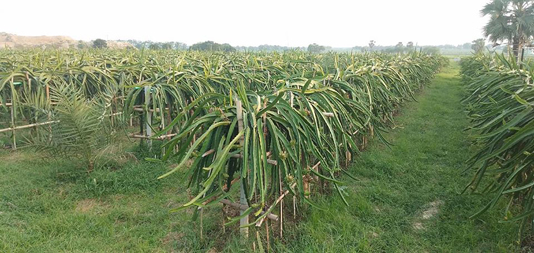By Dr Aynal Haque
RAJSHAHI, June 23, 2020 (BSS) – Commercial farming of dragon fruit has started gaining popularity in Rajshahi Barind area after the best uses of its suitable climatic condition and topography for the last couple of years.
Many of the entrepreneurs have set up dragon orchards and are doing successful business in different areas of the dried region.
An orchard of dragon, a delicious but non-conventional fruit in Bangladesh, has been established on seven bigha of land in Pirijpur area under Godagari Upazila on a joint venture namely Pirijpur Agro Farm Limited.
“We are harvesting and selling dragon on online amid the Covid-19 pandemic at present,” said Shish Muhammad, a shareholder of Pirijpur Agro Farm, adding they are getting enormous response from the wholesalers and retailers.
In addition to meeting up the local demands, they are reaching their harvested fruits to different areas in the capital city Dhaka and port city Chattogram through courier services.
Muhammad mentioned that they have already harvested and marketed 2,200 kilograms of matured dragon from June 2 to 19 last. More other ripened dragons are expected to be harvested within the next couple of days, he added.
The fruit is being sold at Taka 200 to 450 per kilogram according to size and quality at present.
Hedayetul Islam, an entrepreneur, has established an orchard on ten bigha of land at Boshantapur area under the same upazila.
Godagari Upazila Agriculture Officer Shafiqul Islam said the dragon fruit has been cultivated on more than 20 bigha of land only in the upazila.
Looks like cactus, each dragon tree lasts for 20-30 years and gives 20-25 fruits each season. Though the fruit is new in the country, there is a demand of the fruit among people, said Agriculturist Islam.
Rafiqul Islam along with three of his friends first started to cultivate the fruit on experimental basis in Kendobona area under Nachole Upazila in Chapainawabgonj district. After getting some profit, they became more interested in cultivating the profitable fruit on a large scale.
Rafiqul mentioned that the cultivation of the fruit is profitable and they are expecting good profit this year. He said the cultivation process is not only easy but also the required investment is very low.
He said they sell the fruit to local customers for Tk 300-400 per kilogram. Rafiqul’s friend and business partner Nur-e-Alam Siddiqi Babu said the demand of the fruit is increasing as it looks beautiful and the taste is also good.
Abdul Matin, another farmer of Gofanagar village under Mohadevpur upazila in Naogaon, has set an instance of becoming successful through dragon farming in the area.
After getting technical support from the local horticulture centre, Abdul Matin started the farming on August 10, 2016. Already, he has started getting fruit for the last three years. Now, there are 50 dragon plants in his orchard.
Agriculturist Sudhendra Nath Roy, Additional Director of the Department of Agriculture Extension, said the vast Barind tract has started gaining popularity both at farmer and consumer level for its high commercial and nutritional values.
More than 125 demonstration plots of the cash crop were established in different areas in the region.
Dr Saifur Rahman, Deputy Director of Regional Horticulture Development Centre, said soil and weather of the region is favourable for the fruit.
Dragon fruit is suitable for everyone to eat. Flesh and seeds are edible parts and they are eaten altogether. It supplies fiber which is digestive and helpful for healthy liver. The rest portion of the fruit includes carbohydrates and water.
It is mildly sweet tasting and especially low in calories. The seeds are digested only if chewed. The flavonoids in dragon fruit lower the risk of heart disease and high blood pressure.
It also reduces oxidative stress and artery stiffness as found in animal studies and therefore is thought to prevent complications associated with diabetes. The high antioxidant levels lower the risk of many types of cancer, Dr Rahman elaborated.



